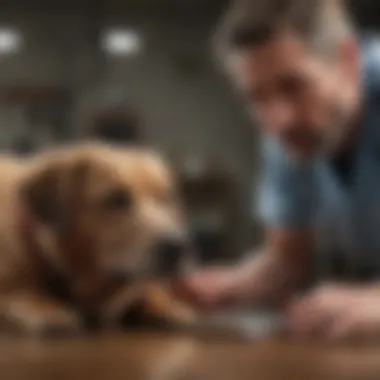Effective Strategies to Alleviate Diarrhea in Dogs


Intro
Diarrhea in dogs is a common ailment that often worries pet owners. Understanding its causes and effective management strategies is crucial for ensuring the health and comfort of your furry companion. Recognizing when diarrhea becomes a serious issue can make a significant difference in recovery. This section provides pertinent information and actionable strategies to assist in alleviating this distressing condition.
Understanding Your Pet
Breed Traits
Different dog breeds can have varied gastrointestinal sensitivities. For instance, smaller breeds like Chihuahuas may be more susceptible to digestive issues compared to larger breeds. Knowing your pet's breed traits can help you understand their unique health considerations, including potential reactions to certain foods.
Common Temperaments
The temperament of a dog can influence their eating habits and stress levels. A nervous dog might display digestive issues more frequently during stressful situations. Monitoring your dog’s behavior can provide insights into any underlying causes of diarrhea.
Special Needs
Some dogs have special dietary needs. Dogs with conditions such as food intolerances or allergies may require specific diets. If your dog experiences frequent diarrhea, discussing these needs with your veterinarian can lead to better management strategies.
Dietary Adjustments
Nutrition and Feeding Guidelines
Proper nutrition is vital in managing diarrhea in dogs. A bland diet comprised mostly of boiled chicken and rice can often be beneficial. When introducing new foods, it is essential to do so gradually to prevent further gastrointestinal upset.
Hydration Strategies
Maintaining adequate hydration is critical when a dog suffers from diarrhea. Dogs lose considerable fluids, making it vital to encourage water intake. You can enhance hydration by offering broth or water-rich foods, like pumpkin.
Proper hydration will support your dog's recovery and overall health.
Probiotics
Probiotics can help restore healthy gut bacteria and improve digestion. Consider seeking advice from your veterinarian to choose a suitable probiotic supplement for your pet. These can aid in restoring normal bowel function, especially after a bout of diarrhea.
When to Seek Veterinary Assistance
Recognizing Warning Signs
While minor cases of diarrhea can often be managed at home, certain symptoms necessitate immediate veterinary attention. These can include persistent diarrhea lasting more than 24 hours, blood in the stool, or signs of dehydration such as lethargy or dry gums.
Preventive Health Checks
Routine veterinary visits can help catch underlying health issues before they escalate. Regular check-ups ensure that vaccinations are current and that your dog receives appropriate preventive care.
Understanding Canine Diarrhea
Understanding canine diarrhea is essential for pet owners. Not only does it indicate an underlying issue, but it also affects the overall well-being of the animal. Diarrhea can lead to dehydration, which is dangerous. Knowledge of the subject helps owners act quickly and effectively to manage their dog’s health.
Definition and Symptoms
Canine diarrhea is characterized by an increase in the frequency, fluidity, or volume of bowel movements. A typical stool presents a certain firmness and color. When a dog experiences diarrhea, the stool may appear loose and watery.


Symptoms may also include:
- Frequent bowel movements: More than usual.
- Straining to defecate: Observably excessive effort.
- Abdominal discomfort: Often shown by whining or pacing.
- Possible vomiting: This may occur alongside diarrhea.
These symptoms can indicate various issues, ranging from a mild stomach upset to severe illnesses. Monitoring them is crucial.
Types of Diarrhea
Diarrhea can be categorized based on its nature. A brief overview includes:
- Acute diarrhea: Sudden onset, usually short-lived. Often linked to dietary changes or infections.
- Chronic diarrhea: Lasting over a week. May require veterinary attention for diagnosis.
- Large bowel diarrhea: Involves frequent small amounts of stool. Symptoms like straining are common.
- Small bowel diarrhea: Features larger volumes but less frequency. Often diarrhea with a more fluid consistency.
Understanding these types aids in determining appropriate interventions or when to seek veterinary care.
Causes of Diarrhea in Dogs
The causes of diarrhea in dogs are diverse. Some common triggers include:
- Dietary indiscretion: Eating spoiled food or non-food items.
- Food allergies: Reactions to ingredients in dog food.
- Bacterial infections: Exposure to harmful bacteria from unclean sources.
- Viruses: Canine parvovirus is a serious concern.
- Parasites: Worms or protozoa can lead to gastrointestinal disturbances.
- Medications: Some drugs can have side effects that include diarrhea.
Recognizing these causes can facilitate quicker recovery. Identifying triggers can also prevent future occurrences.
Immediate Interventions
Immediate interventions are critical when a dog experiences diarrhea. The prompt and appropriate response can make a significant difference in the dog's recovery process. Diarrhea can lead to dehydration and nutritional deficiencies if not addressed quickly. Therefore, pet owners must recognize the urgency of implementing certain strategies right away.
Fasting Period Recommendations
When a dog suffers from diarrhea, one of the first steps is to initiate a fasting period. This does not mean withholding food for an extended time. Generally, a 12- to 24-hour fast is sufficient for adult dogs. During this time, it's important to monitor the dog's behavior and condition. If the dog is a puppy or a senior, consider shortening the fasting duration.
Fasting allows the digestive system to rest and recover. The absence of food gives the intestines time to heal and reduces further irritation. This approach has been widely practiced and provides a simple yet effective way to manage mild cases of diarrhea.
Hydration Strategies
Hydration is essential during episodes of diarrhea. Dogs lose fluids rapidly, which can lead to severe dehydration. Ensuring that the dog stays hydrated is crucial for its recovery. Pet owners should encourage their dogs to drink water regularly. If the dog is reluctant to drink, it may be possible to offer ice cubes or a flavored electrolyte solution.
Importance of Electrolytes
Electrolytes are vital for maintaining the body's fluid balance. When dogs experience diarrhea, they lose not only water but also important electrolytes like sodium, potassium, and chloride. Restoring these electrolytes helps to support normal cellular function and overall hydration.
Pet owners should look for products specifically designed for canine electrolyte replacement. These solutions are popular because they are formulated to appeal to dogs and provide rehydration without the risks associated with human electrolyte drinks, which can be harmful due to their sugar and caffeine content. Unique to canine electrolytes is the balance they strike, ensuring that dogs receive what they need without adverse effects.
Hydration Techniques for Dogs
There are several techniques to ensure dogs receive adequate hydration. Providing fresh, clean water in a suitable bowl is a key starting point. Many dogs have a specific preference for bowl type. Some may prefer a stainless steel bowl to ceramic or plastic. Additionally, using a water fountain can encourage some dogs to drink more often, as running water tends to attract their interest.
Another technique is to introduce wet food into their diet temporarily. Wet food has a higher moisture content and can support hydration. If the dog is refusing food, administering broth can also help. Make sure to avoid any onions or garlic in the broth, as these are harmful to dogs.
Pet owners should avoid giving soda or sweetened drinks to dogs. These can worsen diarrhea and lead to other health complications. Finding the right hydration techniques can be beneficial during this distressing time, supporting recovery effectively.
Nutritional Adjustments
Nutritional adjustments play a crucial role in managing diarrhea in dogs. When a dog experiences digestive upset, the right diet can help restore balance and promote recovery. Adjusting a dog's nutrition during these times can alleviate symptoms and provide essential nutrients for healing. It is important to choose appropriate food options that are easy to digest. This can help reduce gastrointestinal irritation and assist in minimizing symptoms.


Preamble of Bland Diets
Bland diets are often recommended for dogs suffering from diarrhea. They typically consist of easy-to-digest ingredients, which allow the digestive system to rest. Two common components in a bland diet are rice and boiled chicken.
Rice and Boiled Chicken
Rice and boiled chicken form a minimal yet effective meal for dogs with diarrhea. This combination is gentle on the stomach and helps bulk up stool. Rice, particularly plain white rice, is low in fiber and easy to digest. It provides carbohydrates, which are an energy source without putting stress on the gastrointestinal tract. Boiled, skinless chicken is protein-rich and low in fat, making it suitable for dogs recovering from digestive issues. The key characteristic of this diet is its simplicity. It minimizes potential irritants that can exacerbate diarrhea. However, it's crucial to avoid seasoning or adding oils, as these can worsen the condition.
The unique feature of rice and boiled chicken lies in its blend of essential nutrients while remaining bland. This approach helps dogs regain their appetite and stabilize digestion more quickly. While this diet is beneficial, it should not be fed long-term due to nutritional deficiencies if used beyond three to five days. Once the diarrhea subsides, gradual reintroduction of regular food is necessary.
Pumpkin and Its Benefits
Pumpkin is another noteworthy option in managing diarrhea in dogs. Pure canned pumpkin (not the spiced pie filling) is fiber-rich and contains essential vitamins. The important aspect of pumpkin is its high soluble fiber content, which helps absorb excess water in the intestine. This property can assist in firming up loose stools. It is considered a beneficial choice because of its natural dietary fiber that supports better digestive health.
The unique feature of pumpkin is its versatility. Dogs generally accept its taste well, making it easy to incorporate into their diet. Pumpkin can be given in various forms, like purees mixed with rice or as an addition to commercial dog foods. Its advantages include not only diarrhea relief but also improving overall gut health if added to the diet regularly. However, excessive amounts can lead to constipation, so moderation is key.
Recommended Nutritional Supplements
In addition to dietary adjustments, certain nutritional supplements can aid a dog's recovery from diarrhea. Probiotics are among the most well-known options. These live bacteria help restore healthy gut flora, which may be disrupted during episodes of diarrhea. Including digestive enzymes can also enhance nutrient absorption. Moreover, supplements containing electrolytes may prove beneficial, especially in cases where excessive fluid loss occurs. Always discuss with a veterinarian before adding any supplements to ensure safety and dosage appropriateness for your dog.
Probiotics and Digestive Health
Probiotics have gained attention for their potential to enhance digestive health in dogs, particularly during episodes of diarrhea. These beneficial microorganisms contribute to a balanced gut microbiome, which is crucial for optimal digestion and overall health. Understanding how probiotics function can be important for pet owners looking to alleviate diarrhea and promote recovery within the confines of their dog's digestive system.
Role of Probiotics
Probiotics are known to support digestive health by restoring the balance of gut bacteria disrupted by diarrhea. They can help combat harmful pathogens that may be present in the gastrointestinal tract. Below are key roles probiotics play:
- Restoration of Gut Flora: They reintroduce beneficial bacteria that help restore a healthy gut environment.
- Immune System Support: Probiotics can enhance immune responses, which may be compromised during gastrointestinal distress.
- Nutrient Absorption: They can improve the absorption of nutrients from food, which is important for recovery from diarrhea and malnutrition.
- Reduction of Inflammation: Some strains have anti-inflammatory properties that can soothe an irritated digestive tract.
- Stool Regulation: By promoting normal bowel function, they can help regulate diarrhea and restore normal stool consistency.
The inclusion of probiotics in a dog's diet can be particularly effective as a preventive measure or a treatment during episodes of diarrhea.
Choosing the Right Probiotic
Selecting an appropriate probiotic for dogs can be perplexing, given the variety of products available on the market. It is important to consider several factors when making a choice to ensure maximum benefits:
- Strain Variety: Different strains have different effects. Look for specific strains known to be beneficial for canine digestive health, such as Lactobacillus and Bifidobacterium.
- CFU Count: The colony-forming units (CFUs) should be high enough to provide health benefits. A count of 1 billion to 10 billion CFUs is generally recommended.
- Shelf Stability: Ensure the probiotic can maintain effectiveness without refrigeration. This is crucial for ease of use and storage.
- Ingredients: Check for additional beneficial ingredients like prebiotics, which can further enhance the effectiveness of probiotics.
- Veterinary Approval: Opt for products endorsed by veterinarians or backed by scientific research to ensure quality and safety.
An informed choice of probiotics can make a significant difference in your dog's digestive health.
By focusing on these elements when choosing probiotics, pet owners can help ensure they select products that will effectively support their dog's recovery from diarrhea and promote long-term digestive health.
Behavioral and Environmental Considerations
Understanding the behavioral and environmental aspects of your dog’s life is crucial in managing diarrhea. Dogs are sensitive creatures. Their environment and emotional state can greatly influence their digestive health. An appropriate environment, combined with stress management, plays an integral role in alleviating diarrhea. Here are two key elements to consider:
Stress and Anxiety Management
Stress can trigger a range of health issues in dogs, and diarrhea is one of them. Events such as storms, loud noises, or even changes in routine can induce anxiety. The dog’s body responds to stress by releasing hormones that may upset the digestive system. Here are some strategies for managing stress:
- Routine: Establish a consistent daily routine for feeding, walking, and playing. Dogs tend to thrive on schedules.
- Safe Space: Create a designated area where your dog can retreat when feeling anxious. This could include a bed, toys, and familiar scents.
- Calming Aids: Products like pheromone diffusers or anti-anxiety wraps can also be beneficial. They might help soothe your dog during stressful times.
Important Note: Consult with a veterinarian before introducing any supplements or medications designed to relieve anxiety.


Maintaining a Clean Environment
A clean environment is essential for promoting your dog's overall health. A dirty living space can harbor bacteria and parasites that may contribute to diarrhea. To minimize risks, consider the following steps:
- Regular Cleaning: Ensure that your dog’s bedding and toys are washed regularly. Remove any waste from your yard promptly.
- Food Hygiene: Store dog food in a clean, dry place. Ensure that bowls are washed after each meal to avoid contamination.
- Paw Care: After walks, check and clean your dog’s paws to prevent them from bringing home dirt and germs.
When to Seek Veterinary Care
Understanding when to enlist the help of a veterinarian is crucial in managing a dog's diarrhea. Pet owners should monitor both the severity and duration of the symptoms. Diarrhea can often be managed at home, but there are situations where professional intervention is necessary. This section highlights key indicators that should prompt a visit to the veterinarian.
Signs Indicating Serious Issues
Recognizing the signs of more significant health issues in dogs is important. Some symptoms warrant immediate attention:
- Dehydration: If your dog is drinking abnormally little water or showing signs of dehydration, such as dry gums or lethargy, it is essential to seek help.
- Blood in Stool: The presence of blood, whether fresh or digested, is often an alarming sign. This could indicate a serious gastrointestinal problem.
- Persistent Diarrhea: If diarrhea lasts more than 24 to 48 hours, or if it occurs repeatedly, a veterinary evaluation is recommended.
- Vomiting: Accompanying vomiting, especially if it's severe, can compound the risk of dehydration and indicates a more serious condition.
- Lethargy: If your pet appears more tired than usual and less responsive, it may indicate overall distress.
- Abdominal Pain: Signs of distress when the abdomen is touched can signal serious issues needing immediate attention.
Important Note: Always err on the side of caution. If in doubt, consult with a veterinary professional.
Understanding Diagnostic Procedures
When you take your dog to the veterinarian, understanding what to expect can ease the process. Several diagnostic procedures may be undertaken to identify the root cause of diarrhea. Typical assessments include:
- Physical Examination: A thorough examination to note any signs of dehydration, pain, or abnormalities.
- Fecal Tests: Tests for parasites, bacteria, or other pathogens in the stool.
- Blood Tests: Evaluating overall health and checking for infections, organ function, or other underlying conditions.
- Imaging: X-rays or ultrasounds may be utilized to visualize the digestive system and assess any structural issues.
- Allergy Tests: If food allergies are suspected, a veterinarian might perform tests to identify potential triggers.
Overall, understanding these signs and procedures helps ensure timely care and better outcomes for your dog's health. Tracking symptoms and maintaining communication with your veterinarian enhances the chance to revert your dog’s condition effectively.
Long-term Digestive Health Strategies
Ensuring long-term digestive health in dogs is crucial for preventing recurring issues such as diarrhea. With proper strategies in place, pet owners can play a significant role in their dog's well-being. Establishing a routine that emphasizes consistent care and monitoring can yield significant benefits. A proactive stance helps in recognizing potential health issues before they escalate, keeping dogs happier and healthier overall.
Regular Veterinary Check-ups
Regular veterinary check-ups are essential in maintaining a dog's digestive health. Visiting a veterinarian at least once a year allows for monitoring your dog's overall health and addressing any concerns early. These visits facilitate vaccinations, dental care, and preventative measures against common parasites that may contribute to digestive disturbances.
During these examinations, veterinarians can identify any underlying issues that may not be immediately apparent. Potential conditions like food allergies, infections, or even hormonal imbalances can lead to chronic digestive problems if left unchecked. Pet owners should keep track of any dietary changes or behaviors that may signal a problem. It is also important to discuss these observations with the veterinarian during appointments.
Dietary Management for Chronic Issues
When dogs experience chronic diarrhea, dietary management becomes critical. Owners should understand that not all dog foods are equal. Selecting a high-quality diet specifically designed for digestive health can significantly reduce gastrointestinal stress.
Consulting with a veterinarian about a tailored diet plan is essential. Common recommendations might include:
- Limited Ingredient Diets: These contain fewer components which help in identifying food intolerances more easily.
- Hypoallergenic Dog Foods: Formulated to minimize allergic reactions, these can be beneficial for sensitive dogs.
- Fiber Enrichment: Adding fiber sources like pumpkin or specific fiber supplements can aid digestion.
It's vital to introduce any new diet gradually to avoid shocking the digestive system. Alteration in diet should be monitored closely for results. This can help in refining what works best for your dog.
End
In managing canine diarrhea, the significance of implementing effective strategies cannot be overstated. Addressing this common issue requires timely response and informed decisions to ensure the health and well-being of dogs. The consequences of untreated diarrhea can result in dehydration and discomfort, leading to more serious health complications. By understanding dietary changes and hydration techniques, pet owners can actively contribute to their dog's recovery.
Summary of Best Practices
When dealing with diarrhea in dogs, consider the following best practices:
- Fasting Period: Allowing a short fasting period can help the gastrointestinal tract reset and recover. This should generally last around 12 to 24 hours, depending on the dog's age and condition.
- Hydration: Maintain fluid balance by encouraging water intake. Adding electrolytes can be beneficial. Products like Pedialyte may be useful but consult your vet first.
- Diet Adjustments: Gradually transition to bland diet options like boiled chicken and rice. Maintain this diet until symptoms improve. Introducing pumpkin can offer additional fiber and support.
- Probiotics: These can help restore normal gut flora. Selecting quality probiotics designed for dogs will enhance digestive health.
- Environment Care: Maintain clean living spaces to minimize stress or additional irritants that could exacerbate diarrhea issues.
Encouragement for Pet Care
It is essential for all pet owners to be proactive about their dog's health. Monitoring their pets for signs of digestive distress shows a commitment to their well-being. Regular check-ins and familiarity with their habits will enable timely interventions. The responsibility lies with us to ensure our companions enjoy a high quality of life.



